Putting this here so it is easy to share 🙂
My philosophy is big on connections and seeing the capability and wonder of growing and learning. I am the tree, where I provide safety, fun, laughter and love for children.
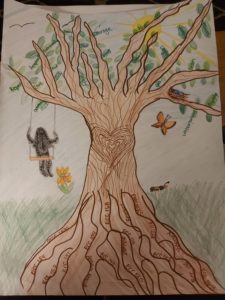
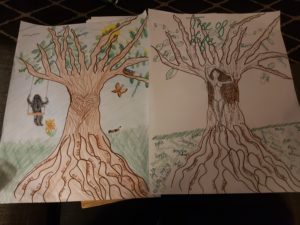

Putting this here so it is easy to share 🙂
My philosophy is big on connections and seeing the capability and wonder of growing and learning. I am the tree, where I provide safety, fun, laughter and love for children.


I’ve chose to add my reflective moment from page 5 as well as my brief notes of things that either resonated, or inspired me through reading the textbook.
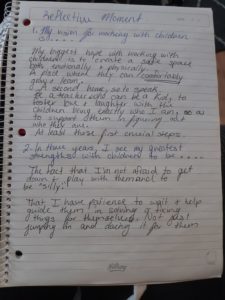
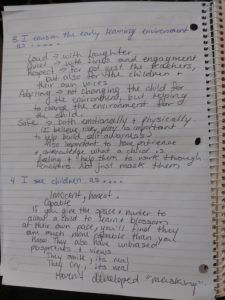
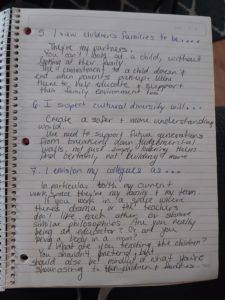
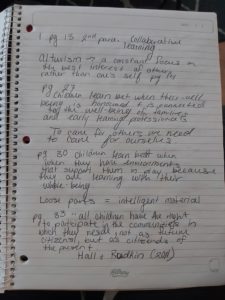
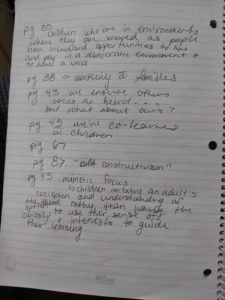
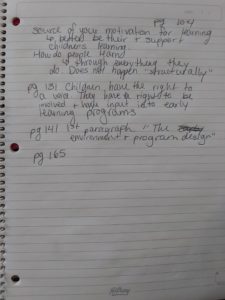
One thing that COVID-19 and this course has shown me is that as ECE’s we are often overlooked. There was a global pandemic resulting in multiple centers needing to close in order to protect staff, and the families attending. This decision was not made lightly and in BC was not mandatory. For the centres that chose to stay open they received government funding to take “essential workers” children and so staff could receive “hazard pay”. While the funding was also offered to those who remained closed, as always it was short lived. We were only “essential” when they chose. What supports will we receive now? No plan of action has been made, that I could find to help continue to support ECE’s.
For months, the economy took a hit due to people not being able to find care for their children, causing much uproar in communities. There was a point where the government started referring to childcare as “essential”. Now that we are open, and the school year is upon us the school divisions are running at reduced numbers and offering online work in order to help keep the numbers from rising. Yet for childcare funding is being cut, forcing many centres to HAVE to increase their numbers in order to pay the overhead costs. The support and recognition ceased for those closely working with young children, placing us back into the place of being high risk for exposure, as well as being grossly underpaid and without guidance on how to move forward to protect families and staff.
http://www.bccdc.ca/Health-Info-Site/Documents/COVID_public_guidance/Guidance_Child_Care.pdf
In this link is the only real guidance that childcare has received from public health. It is only two pages and doesn’t outline any tangible steps childcare can take in order to protect staff and families. Simply stated is that its low risk for children to catch it, that we should review and revise our health policies, but no ideas or guidance. To me, it feels as though it is more to be a “you’ll be fine” statement that a guideline. Even from licensing the most guidance we have received is much the same, revise our health policies. Centres have had to take their own measures to protect their families, by having daily health declarations, temperature checks, as well as new rules for how to conduct parent-teacher interactions at both drop off and pickup. Some centres have ramped up cleaning, and that is it. They are not aware of anything else that they can be doing to protect those in contact with the centre. Simply because many are just trying to survive.
In recent news we have seen cases linked to childcare settings resuming operation. In Calgary and Leamington, Ontario are two examples of this. Below are the related news articles.
Everything that we have been striving for and working towards as a profession is once again coming to a slow drip. We need to find our voices again as educators and advocates. It is our professional duty to act and not just complain. Better support for teachers means better support for children.
Join ECEBC, let the government know that we are in fact professionals and deserve to be treated as such.
Go to the ECEBC meetings. Stay up to date on current issues, or opportunities to share your voice in your community.
Write to the government, show them that our education is worth more than simple child minding. That we are a profession weakened by lack of support. Not just for a pay raise, but for a better childcare system for our families and communities.
https://www.ourcommons.ca/Members/en/rachel-blaney(89354)#contact
https://www.cicic.ca/1301/ministries_departments_responsible_for_education_in_canada.canada
Become apart of the ECE community on Facebook. I recently joined a group that’s focus is to educate, advocate and support ECE’s in BC.
https://www.facebook.com/groups/434083326780322/
It is time for ECE’s to find our voices again and utilize our education and passion to advance our profession, one letter, one meeting, one step at a time.
My biggest hope with working with children is to create a safe space both emotionally and physically. A space where they can comfortably grow, as well as gain a better understanding of themselves and the world around them. Where learning is not linear and never ends not for the children, but also for the families and educators. A space where children can ask questions and gain understanding through play and be encouraged to do this through patience and support from me not just as a teacher, but also a collaborative learner. Children should be free to engage and learn in ways that are meaningful to them as the unique and capable individuals they are. They should feel valued and respected for who they are in this moment, not just for who they can one day be.
As an early childhood educator, I do not want to predetermine what a child should be learning in a day. Instead I want to achieve an environment that is engaging, sparks curiosity, and imagination that is focused more on play and what direction each child can take that play and thus their learning. As a teacher I want to be actively engaged in whatever form of play the children are so that I can better hear their voice and understand them as an individual. I can then connect these moments of learning to the living inquiries set by the BC Early Learning Framework and create activities that can further extend their growth and development in the five developmental domains.
The philosophy that I have found resonates the most with my own personal philosophy is the Reggio Emilia Approach. The approach was created out of need from families after the Second World War. Not only did the families need care for their children but they also wanted “an environment where children could acquire the critical-thinking and collaboration skills essential to rebuilding and ensuring a democratic society” (Beverlie Dietze, Diane Kashin, 2016, p. 98). In this philosophy the children are leaders in their learning, and the teachers are there to support and give respect to their individual learning, as well as to adapt the environment to become “the third teacher” (Beverlie Dietze, Diane Kashin, 2016).
In my personal philosophy I also want to strive to acknowledge the importance of families and community in early childhood education. As teachers we listen not just to react but to understand and better guide the children in our care. We are fortunate that in Canada we experience much diversity in our daily lives but are we really embracing and sharing our cultures and differences? I hope to create a space where families are encouraged to express their needs and expectations of their child’s learning. Where we openly embrace ourselves for our unique cultures and take the time to understand and acknowledge others as well.
My hope is to create a safe space where children feel as though they can ask questions, follow their curiosities and be celebrated and respected for who they are. A safe place where no feeling is too small or too big. A space that is loud with laughter, quiet with the focus of wonder, respectful and adapting of teachers, children and families as individuals, and a safe place that children (and their families) can trust, be open and honest and all be a collaborative team in the journey of development, understanding and knowledge.
I want to always be a teacher who is patient and gives a voice to children. Someone who never stops reflecting and adapting as I continue to learn. To not forget those little moments and the sense of wonder and excitement that comes with being a child.
Beverlie Dietze, Diane Kashin. (2016). Empowering Pedagogy for Early Childhood Education. Toronto, Canada: Pearson Canada Inc.
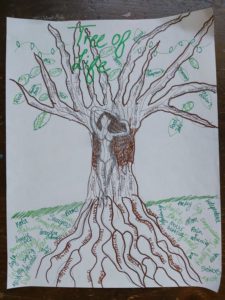
* please excuse the naked silhouette I tried a couple different styles and this was the only one I liked haha (yes it is meant to represent me)
I had a different approach to the tree of life initially but decided to place a bit more time, effort, and meaning into it.
Not going to lie, had quite a few tears today as I read through previous essays and my own person journal entries from over the years. Thinking about where I’ve been, and where I am now was a lot today. Lately I feel like I’ve been taking steps backwards instead of forwards, but this time when I do start going forward again I’m going to be stronger and build the branches from the trunk properly.
I need to remember that it’s okay to not be okay, and that we always have to keep changing and growing. A tree changes every season but the trunk and roots will always be the same. It’s okay if branches are broken or changed, and if a leaf doesn’t grow back, doesn’t mean that it cant again in the future. Sometimes it’s best to leave certain leaves on the ground to become roots or “nutrients”.
The roots are what have helped in giving me foundation, and starting me to grow. The grass/dirt are people and things that gave life to those roots. The roots that would eventually create me, the silhouette in the centre.
The trunk is made up of my values and skills, the branches reaching for the sky and my dreams and Hope’s.
All of the leaves are those who have blossomed and become my family, my positive influences.
I haven’t been doing too great and needed this reminder. And honestly needed a safe place to truly share it.
Thank you for creating a place that allows for people to grow and blossom ❤
These are the flowers and legacy I wish to leave behind. Kindness- towards others and nature, courage- to be true to their heart, love- both people, knowledge and themselves. And acceptance. I want to spark imagination, wonder and joy for any child in my care.
I’ve been so focused on everything else lately, that it was nice to take a moment and focus on me in the process of this assignment.
It may seem like things are overly romanticized and far fetched but it’s what I hope to leave in my place one day. I’m in this field because my passion has lead me here, and my passion at times is emotional and bright as a flame.
I feel as though my philosophy is far out of reach in terms of having it fit into a box. But my philosophy is something that is child lead. Some children need to understand the mechanics of something, others need the room to laugh and be wild. All need love and support, regardless of where they are developmentally, financially, or anything in between.
So this is my Tree of Life, or the tree of Madison
THE TREE OF SUN.
(A nickname given to me by Miranda and her hubby)
I’m pretty proud of it. And the kid in me loved busting out the markers and colours for it 😉
The programs that were researched in our group was Montessori, Young Families, Waldorf, and Roots of Empathy.
I really enjoyed hearing about Monetssori and Waldorf schools as it has always been a point of interest for me. I still sometimes have trouble seeing the differences between the two as they are very similar. I think in the future I would really enjoy to do some of my own research on them.
I loved that the common theme between all of the programs was one of respect and having things be child led. All are focused on different ways to go about that, but still are rooted in the same passion of caring for and supporting youth for a better future.
Roots of Empathy
Roots of Empathy was created in 1996 by Mary Gordon an internationally recognized educator, author, social entrepreneur and child advocate. The program was created to teach children about the power of a secure relationship between infants and their parents. The infants are considered the “little teachers” and with the help of a trained instructor can help children identify and reflect on not only their own feelings, but also the feelings of others. Instructors visit the classroom before and after the infant visits in order to prepare and reinforce the learning using one of their specialized lesson plans. The students then become the “changers”. They are the future leaders and the goal of Roots of Empathy is to “To build caring, peaceful and civil societies through the development of empathy in children and adults”. The program is designed for 5-13-year-old children, they also offer a childcare (ages 3-5) program called the Seeds of Empathy that was created in 2005.
British Columbia was one of the first provinces to embrace the roots of empathy program and helped to co-pilot the seeds of empathy program. Any school or childcare centre can choose to participate and can request to have the program included in their curriculum by simply going onto the Roots of Empathy website. You can also choose to take part in the program as a volunteer family or can become a trained ROE instructor yourself.
This program meets all five quality indicators outlined in our textbook Empowering Pedagogy for Early Childhood Education by Beverlie Dietze and Diane Kashin. The program offers experiences that help children feel like they belong, are understood and cared for, this can be extended to their families as well in the fact that the children are able to take their learning of empathy and better understanding of their own feelings home with them. It relies heavily on interaction and is constantly being reflected and changed depending on the need of the children. The curriculum is flexible in that there are no wrong answers and set outcomes. It is simply meant to be a learning experience and to help children better understand themselves and others.
“In society, we generally measure what we treasure. Traditionally, schools have measured children’s competence in subject areas. Roots of Empathy measures the affective side of children’s knowledge, understanding, and attitudes.”
– Mary Gordon, Founder/President, Roots of Empathy
For my second journal I have chosen one that focuses on challenging behaviours, as they can sometimes be a point of burn out, and general frustration for me, and often I label behaviors as challenging when they by definition aren’t and often associate the term “bad” with those behaviours from my own upbringing.
I’ve chosen and article titled Registered Early Childhood Educators’ (RECEs) Perceprions of Children who Exhibiy Challenging Behaviours in the Classroom. By: Diana Chow, Christina DiNardo, Amy Nicole Garthson, Oi Ling Helen Kwok, Susan Elizabeth O’Neill, Dr. Sharon Quan-McGimpsey
The article can be found in Interaction Volume 29 Number 2 Fall 2015 pages 27-30.
Would like to note that the following article ties into challenging behaviours by looking at how eces can manage the stress involved with challenging behaviors.
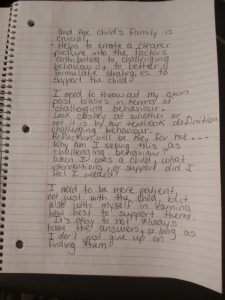
Journal #2 page 2
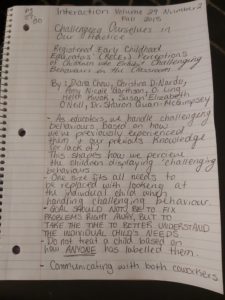
Journal #2 page 1
I have chosen to take my site in a more personal direction for myself. Well attempting to at least let’s hope I’ve managed to figure out how to upload my pages. While doing anything I always handwrite it out first then type, since this is about my learning, I’ve chosen to present it authentically.
Hopefully this works and you’re able to read it 🙂
The article I read is called, The Unhurried Child: Visioning an Intergrated System written by Susan CColley. It can be found in the spring 2006, volume 20 number 1 Interaction page 32-33.
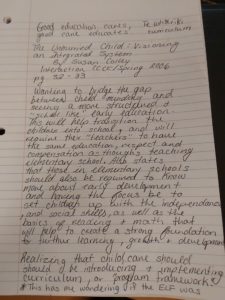
Page 1
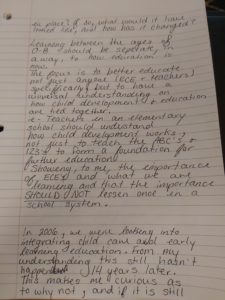
Page 2
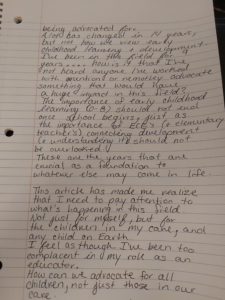
Page 3
I’ve been what feels like on a cloud the last few weeks. We have returned back to work but everything has changed.
The past 4 months with being off due to COVID has allowed me to focus more on school, but I missed out on taking that classes learning and using it right away.
I am excited and a bit nervous for this course, with it being self paced I’m not always the greatest and remembering to do things, and finding that balance. At least not lately.
This is our final curriculum course but also one that I feel like involves, or should, a lot of self reflection and giving us firm roots into our careers as ECE’s. Everything we’ve learned is being tied together to form our own philosophies not just in a “well I like this”.
It is the beginning of the end to our certificates but also the beginning of forever learning in new ways outside if classroom.
It has been quite a journey, and I am so ready to walk that stage!
Powered by WordPress & Theme by Anders Norén